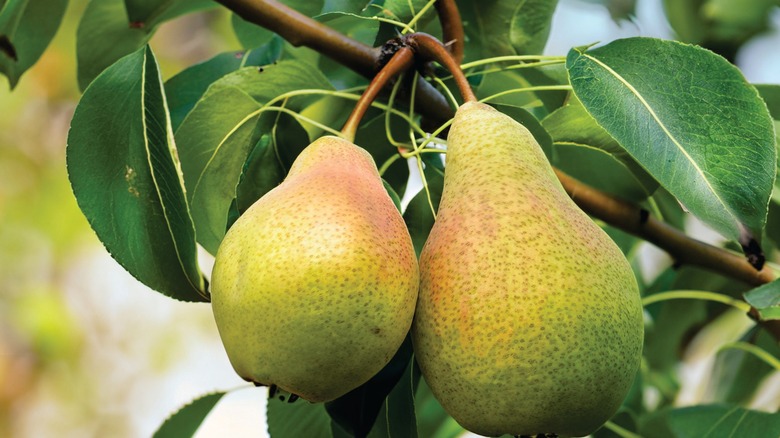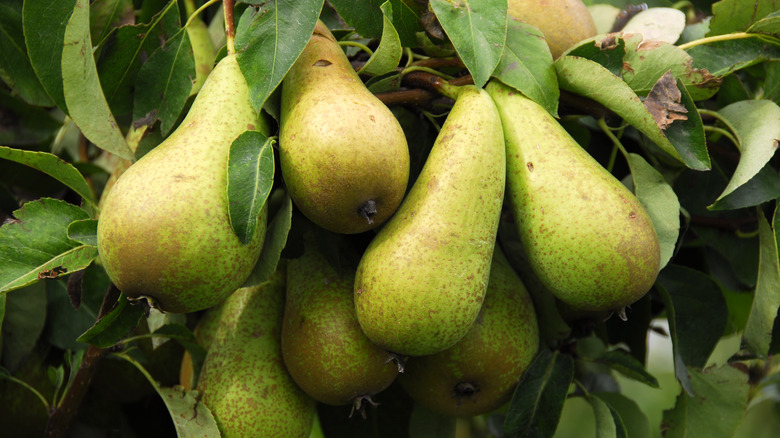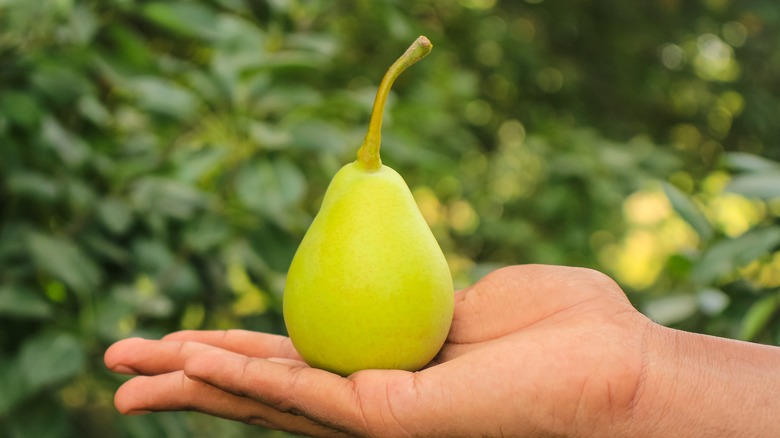Don't Make The Mistake Of Storing Unripe Pears In The Fridge
Contrary to popular belief, you shouldn't store all fruit in the fridge as some fruits won't benefit from the colder temperatures. Take pears for instance. If your pear isn't ripened yet then you should leave it on the counter or in a fruit basket rather than placing it in the drawer of your refrigerator. While the cold can lengthen the lifespan of ripened fruits like pears, avocados, and melons, it can also delay the ripening process. This is great for ripened fruit but not so much for your yet-to-ripen goods. There's nothing worse than biting into an unripe pear — it's both firm and sour and generally unpleasant to eat. As a pear ripens, it begins to sweeten and develops a soft but slightly crunchy texture.
The best way to ensure that your pears ripen is to place them at room temperature — the fruit won't benefit from that 35 to 45 degrees Fahrenheit winter wonderland in your fridge. However, that doesn't mean your pears shouldn't eventually go in the fridge. Once they ripen at room temperature, you should either eat the pear or store it in your fridge's fruit drawer. It will typically last in the ballpark of three to five days from there.
How to tell if a pear is ripe
Like avocados and bananas, pears can be tricky to store because they don't ripen until after they've been picked. As explained in Martha Stewart, "Pears don't ripen on the tree. They are harvested when they are mature—not ripe." Unlike berries like strawberries or blueberries, pears are considered climacteric, meaning they continue to change after being picked. In fruit, the hormone ethylene causes fruits to ripen by softening their cell walls. When picked, pears have a low level of ethylene, but the hormone continues to rise over time. Pears generally become ripe between three to four days after you buy them at the grocery store.
The best way to determine if a pear is ripened is by checking the neck of the fruit. Place your thumb under the stem and press against the skin of the fruit. If it's soft but slightly firm then the fruit is ripe. Likewise, depending on the type of pears, you may notice the skin of the fruit beginning to brown as it ripens. However, it's important to note that not all variants of pears change color. As pears ripen, they also release a pleasant smell.
How to ripen a pear
As long as you don't delay their ripening process by placing them in the fridge, pears will ripen in a matter of days, but if you have a recipe you've been dying to try such as sliced pears in ginger syrup, then you can try to speed up the process. The easiest way to quickly ripen a pear is to place it in bunches with other pears. However, you can also place pears near other climacteric fruits like bananas, tomatoes, or apples. These fruits give off the hormone ethylene, which will make other fruits nearby ripen faster as well. Think of it as if each of these fruits is adding a small gust of wind to a sail on a boat. The larger the gust of wind, the quicker the fruit reaches ripe island.
Alternatively, you can trap the ethylene your pear gives off, placing the fruit into what essentially is a self-contained atmosphere of ethylene. The process for this is relatively simple: All you will need is a paper bag. Place the bag over your fruit and the pear should ripen quicker than if you just left it out on the counter. From there, feel free to place the fruit in the fridge. Just don't do so ahead of time.


